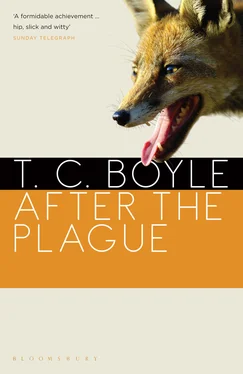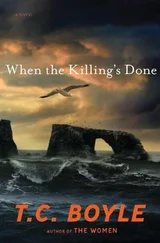In the morning, I stepped into the living room and was outraged all over again. I cursed and stomped and made a fool of myself over heaving the rock back through the window and attacking the shattered glass as if it were alive — I admit I was upset out of all proportion to the crime. This was a new world, a new beginning, and Sarai’s nastiness and negativity had no place in it. Christ, there were only three of us — couldn’t we get along?
Felicia had repaired dozens of windows in her time. Her little brothers (dead now) and her fiancé (dead too) were forever throwing balls around the house, and she assured me that a shattered window was nothing to get upset over (though she bit her lip and let her eyes fill at the mention of her fiancé, and who could blame her?). So we consulted the Yellow Pages, drove to the nearest window glass shop and broke in as gently as possible. Within the hour, the new pane had been installed and the putty was drying in the sun, and watching Felicia at work had so elevated my spirits I suggested a little shopping spree to celebrate.
“Celebrate what?” She was wearing a No Fear T-shirt and an Anaheim Angels cap and there was a smudge of off-white putty on her chin.
“You,” I said. “The simple miracle of you.”
And that was fine. We parked on the deserted streets of downtown Santa Barbara and had the stores to ourselves — clothes, the latest (and last) bestsellers, CDs, a new disc player to go with our newly electrified house. Others had visited some of the stores before us, of course, but they’d been polite and neat about it, almost as if they were afraid to betray their presence, and they always closed the door behind them. We saw deer feeding in the courtyards and one magnificent tawny mountain lion stalking the wrong way up a one-way street. By the time we got home, I was elated. Everything was going to work out, I was sure of it.
The mood didn’t last long. As I swung into the drive, the first thing I saw was the yawning gap where the new window had been, and beyond it, the undifferentiated heap of rubble that used to be my living room. Sarai had been back. And this time she’d done a thorough job, smashing lamps and pottery, poking holes in our cans of beef stew and chili con carne, scattering coffee, flour and sugar all over everything and dumping sand in the generator’s fuel tank. Worst of all, she’d taken half a dozen pairs of Felicia’s panties and nailed them to the living room wall, a crude X slashed across the crotch of each pair. It was hateful and savage — human, that’s what it was, human — and it killed all the joy we’d taken in the afternoon and the animals and the infinite and various riches of the mall. Sarai had turned it all to shit.
“We’ll move to my place,” Felicia said. “Or any place you want. How about an oceanfront house — didn’t you say you’d always wanted to live right on the ocean?”
I had. But I didn’t want to admit it. I stood in the middle of the desecrated kitchen and clenched my fists. “I don’t want any other place. This is my home. I’ve lived here for ten years and I’ll be damned if I’m going to let her drive me out.”
It was an irrational attitude — again, childish — and Felicia convinced me to pack up a few personal items (my high school yearbook, my reggae albums, a signed first edition of For Whom the Bell Tolls , a pair of deer antlers I’d found in the woods when I was eight) and move into a place on the ocean for a few days. We drove along the coast road at a slow, stately pace, looking over this house or that, until we finally settled on a grand modern place that was all angles and glass and broad sprawling decks. I got lucky and caught a few perch in the surf, and we barbecued them on the beach and watched the sun sink into the western bluffs.
The next few days were idyllic, and we thought about little beyond love and food and the way the water felt on our skin at one hour of the day or another, but still, the question of Sarai nagged at me. I was reminded of her every time I wanted a cold drink, for instance, or when the sun set and we had to make do with candles and kerosene lanterns — we’d have to go out and dig up another generator, we knew that, but they weren’t exactly in demand in a place like Santa Barbara (in the old days, that is) and we didn’t know where to look. And so yes, I couldn’t shake the image of Sarai and the look on her face and the things she’d said and done. And I missed my house, because I’m a creature of habit, like anybody else. Or more so. Definitely more so.
Anyway, the solution came to us a week later, and it came in human form — at least it appeared in human form, but it was a miracle and no doubt about it. Felicia and I were both on the beach — naked, of course, as naked and without shame or knowledge of it as Eve and Adam — when we saw a figure marching resolutely up the long curving finger of sand that stretched away into the haze of infinity. As the figure drew closer, we saw that it was a man, a man with a scraggly salt-and-pepper beard and hair the same color trailing away from a bald spot worn into his crown. He was dressed in hiking clothes, big-grid boots, a bright blue pack riding his back like a second set of shoulders. We stood there, naked, and greeted him.
“Hello,” he said, stopping a few feet from us and staring first at my face, then at Felicia’s breasts, and finally, with an effort, bending to check the laces of his boots. “Glad to see you two made it,” he said, speaking to the sand.
“Likewise,” I returned.
Over lunch on the deck — shrimp salad sandwiches on Felicia-baked bread — we traded stories. It seems he was hiking in the mountains when the pestilence descended—“The mountains?” I interrupted. “Whereabouts?”
“Oh,” he said, waving a dismissive hand, “up in the Sierras, just above this little town — you’ve probably never heard of it — Fish Fry Flats?”
I let him go on a while, explaining how he’d lost his girlfriend and wandered for days before he finally came out on a mountain road and appropriated a car to go on down to Los Angeles—“One big cemetery”—and how he’d come up the coast and had been wandering ever since. I don’t think I’ve ever felt such exhilaration, such a rush of excitement, such perfect and inimitable a sense of closure.
I couldn’t keep from interrupting him again. “I’m clairvoyant,” I said, raising my glass to the man sitting opposite me, to Felicia and her breasts, to the happy fishes in the teeming seas and the birds flocking without number in the unencumbered skies. “Your name’s Howard, right?”
Howard was stunned. He set down his sandwich and wiped a fleck of mayonnaise from his lips. “How did you guess?” he said, gaping up at me out of eyes that were innocent and pure, the newest eyes in the world.
I just smiled and shrugged, as if it were my secret. “After lunch,” I said, “I’ve got somebody I want you to meet.”
T.C. Boyle’s novels include World’s End , winner of the PEN/Faulkner Award for Fiction, The Tortilla Curtain, Riven Rock, A Friend of the Earth, Drop City (which was a finalist for the National Book Awards), The Inner Circle and, most recently, When the Killing’s Done . His short story collections include Tooth and Claw and Wild Child , and his stories appear regularly in most major magazines, including the New Yorker, Esquire, Harper’s, Granta and the Paris Review . His work has been translated into twenty-five languages.
T.C. Boyle was recently inducted into the Academy of Arts and Letters. He lives in California.












